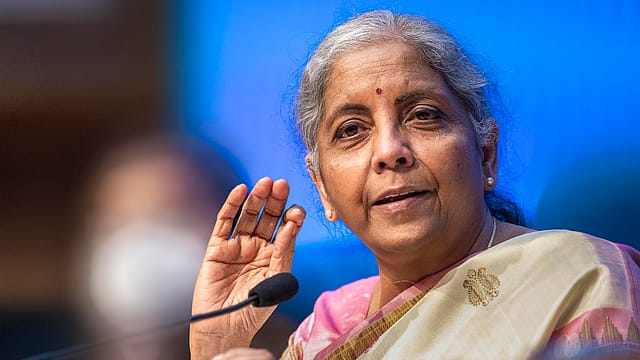India has not legitimised crypto: FM Sitharaman
ADVERTISEMENT

Finance minister Nirmala Sitharaman, during a panel discussion with International Monetary Fund (IMF) managing director Kristalina Georgieva, revealed the reasons why the Indian government imposed a 30% tax on crypto gains. Speaking on the sidelines of the IMF-World Bank Spring Meetings in Washington D.C., the FM talked about the government's apprehensions about the cryptos operating across the world, and why their regulation needs a collective approach by all the countries.
Sitharaman, speaking on the theme ‘Money at Crossroad: Public or Private Digital Money’, said in the February 2022 Budget, that the Centre had come up with a 30% tax on income earned out of crypto transactions. “We don't recognise those (cryptocurrencies), which are outside of the central bank. The central bank is yet to come up with a digital currency, and it was part of my announcement in the budget this year. It will happen sometime in 2022-23, but in the meantime, we have noticed, we are not sure about the veracity of the data, which talks about the volume."
The FM also said that the Centre realised that there are a lot of "things happening about transacting those (crypto) assets, which we don't recognise as currency because the currency is that which is backed by a central bank or the government”. She said because the volume of such transactions was fairly huge, the Centre wanted to make sure it is keeping a trail and these transactions were compliant with anti-money laundering rules. “We wanted to make sure these tools don't end up, inadvertently, being used to fund any kind of terror activities," she added.
Sitharaman also said that by taxing crypto gains, the government wanted to ensure that in the absence of regulation, these transactions, which were becoming huge in numbers, were kept an eye on, and some sort of financial implication was imposed.
"It's not if we have legitimised them. We have not legitimised the currency. We haven't said that this has intrinsic value. But certain operations are taxable for the sovereign," she added.
On the aspect of money flooding in and out of the country via cryptos, Sitharaman said whether it's a central bank-driven digital currency or the crypto assets in the non-government domain, the risks that unhosted wallets carry through these operations (transactions) remain. “So, regulation can't be done by a single country. To do it across the borders, tech does not have a solution acceptable to various countries," she opined.
The FM also said that as long as non-government crypto activities are carried through unhosted wallets, regulation is going to be very difficult. “But cross-border payments will become very effective through the central bank driven currency,” she claimed.
"Even with all this said, there should be a global approach to regulating cryptos, and understanding the technology as it keeps evolving… not to interfere but to keep an eye. Money laundering and using crypto to fund terror activities are the two biggest risks, otherwise, I don't see a reason why innovation should be risky,” she added.
The FM also talked about the government’s initiative to make India a tech-driven country. She said the government has spent a lot of time in the past decade building a digital framework while ensuring data security and data privacy. “We also created India Stack, which is an indigenously developed tech-driven enabler for creating platforms such as the open API.”
The FM said the open Application Programming Interface (API) has enabled the country to create a universal identity biometric-based system called Aadhaar. “We have also created a platform, which is used for the Goods and Services Tax (GST) network. We also made sure that the bills payments system and the unified payment interface are created under the India Stack because there was a common public good that was brought in with the digital innovation,” she added.
During a bilateral meeting with Georgieva, Sitharaman raised concerns about the impact of current geopolitical developments on the global economy and the challenges linked to the rising energy prices.
Explaining India’s policy approach, Sitharaman said an accommodative fiscal stance was also accompanied by major structural reforms, including the bankruptcy code and targeted help to MSME and other vulnerable sections. She said that monetary authority fully supported and complemented these efforts with an accommodative stance.